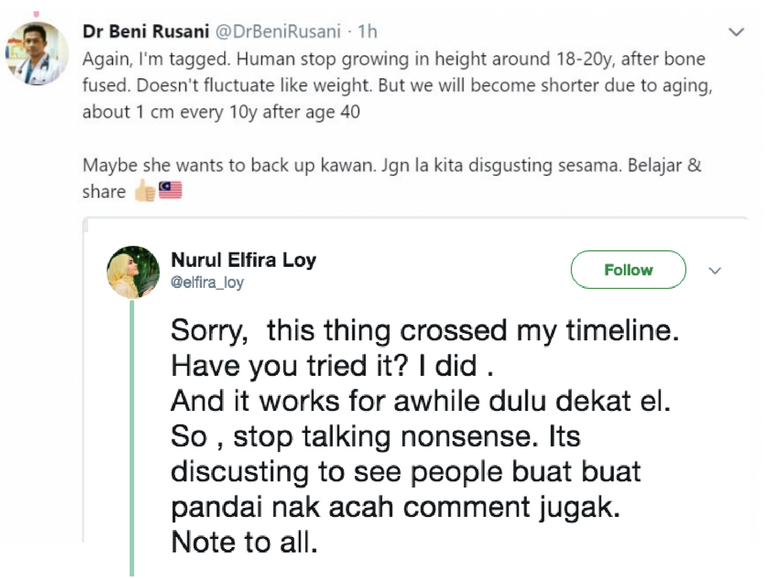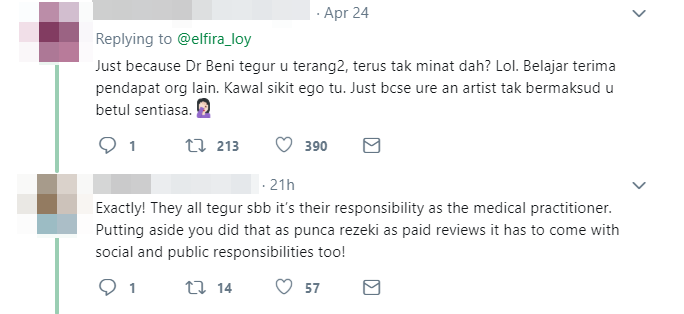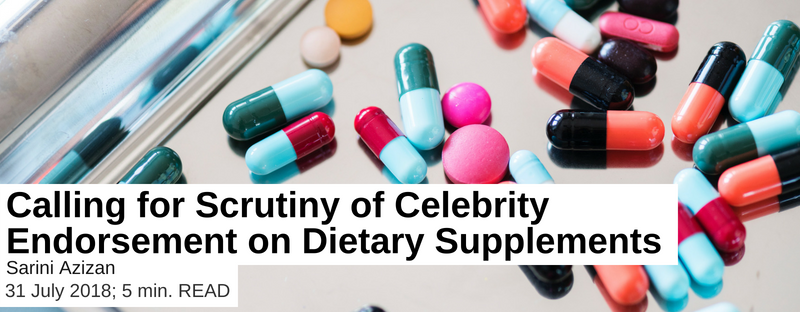Calling for Scrutiny of Celebrity Endorsement on Dietary Supplements
The recent dispute between Malaysian teenage celebrity, Elfira Loy, and netizens over the legitimacy of a height-increasing vitamin, which was also endorsed by an equally loved local celebrity, Neelofa – has probably led many to question the extent of the deep-rooted irrationality in Malaysian society.

This dispute has caught the attention of others, such as medical doctor Amalina Bakri, who called upon Neelofa to show due diligence regarding the endorsed supplement.

The most alarming aspect of this particular height-increasing vitamin is the product’s claim that it is ‘suitable for all ages’. Instructions on the supplement bottles suggest that vitamin can be effective up to the age of 35 years old. These claims are not only untrue, but also irresponsible, whether as a suggestion or not.


Following a flood of criticisms on her endorsement of the product, Neelofa quickly responded by taking down the vitamin advertisement from her Instagram account.
However, simply getting rid of the paper trail does not solve the problem, as the underlying issue of celebrity endorsements is much more of a concern. Although the use of celebrities to promote everyday products is a common marketing practice, it should be more strictly scrutinised particularly with respect to drugs and dietary supplements.
Compared to regular celebrity endorsed products such as cosmetics, drugs and dietary supplements fall into a different category altogether. The impact of consuming these products varies amongst individuals, with some facing life-threatening side-effects.
More shocking is the fact that this is the second time within a year that Neelofa has stirred controversy for promoting supplement products, thus demonstrating her poor business judgment.
Earlier this year, she endorsed a beauty supplement, collagen, which allegedly could be consumed as early as from infancy. While it might be an oversight by Neelofa and her business team for agreeing to endorse the beauty supplement that targets infants for customers, what are her excuses for repeating this mistake with the height-increasing vitamin?
Our field research on the notorious height-increasing vitamins recently suggests, such products are easily accessible via online purchase selling as high as RM250, and also backed up by fake clinical test certificates. This subsequently raised another perplexed question: why there are no monitoring from the health authorities on these celebrities endorsed health-related products? Are we waiting for a fatal accident (touch wood) to get our authorities into high gear?
All these highlight the importance for increased scrutiny of celebrity health-related product endorsements in Malaysia. In comparison to other countries, Malaysia’s regulation on this matter fails miserably.
Taking the US as an example, celebrity endorsements on drugs and dietary supplements are regulated by two different bodies: 1) Food and Drug Administration (FDA) and 2) Federal Trade Consumer (FTC). While Malaysia has Lembaga Iklan Ubat Malaysia (LIU) to monitor drug-related products, there is no agency that monitors marketing or celebrity endorsements for dietary supplement products.
Two of the significant rules outlined by FTC are that they require celebrities to disclose whether they are actually using the endorsed product and the amount of reward received in exchange for their endorsement. This information, although sensitive, helps consumers to determine potential biases associated with celebrity endorsement on the product prior making purchases.
Given how persuasive celebrity influence can extend to the product, it is high time for Malaysia Health authorities to take and implement preventive measures to protect the public against deceptive and misleading information relating to celebrity endorsements specifically on health-related products.
Reference list
Dwivedi, A., McDonald, R. E., & Johnson, L. W. (2014). The impact of a celebrity endorser’s credibility on consumer self-brand connection and brand evaluation. Journal of Brand Management, 21(7-8), 559-578.
Why do companies use celebrity endorsements in advertising? (2015, October 1). Retrieved May 30, 2018, from https://blog.optimy.com/why-companies-use-celebrity-endorsements-advertising/.

Sarini Azizan is a Ph.D. student of Accounting in Australian National University, Australia. Her research explores the theory of source credibility in corporate financial information communication.
Contact info: sariniazizan@yahoo.co.uk




